Strickland Metals says it has connected its Bronco and Konik gold prospects to form one big structure at its Horse Well play near Wiluna, making a bulk-tonnage target with a high-grade surface oxide zone. The company says it has made the crucial interpretation on the back of re-evaluating historic Bronco data in conjunction with its own geological information following its Konik discovery.


Strickland Metals says it has connected its Bronco and Konik gold prospects to form one big structure at its Horse Well play near Wiluna in Western Australia, making what it believes is a bulk-tonnage target with a high-grade surface oxide zone through 500m of strike.
The crucial interpretation comes on the back of the company’s re-evaluation of historic Bronco data in conjunction with its own geological information following its Konik discovery last year.
Management says its new assessment that puts Bronco and Konik on the same structure is supported by historic drilling at the site that includes a hit of 79m at 1 gram per tonne gold 10m smack bang in the middle of the two prospects. Further intersections from Bronco include 89m at 3g/t gold from 18m to the bottom-of-hole and 95m at 0.7g/t from the deepest hold drilled at the prospect.
The company says the intersections – and several others – have never been fully explained or understood.
Bronco was an early cab off the rank in the Horse Well area through reconnaissance rotary air-blast (RAB) drilling by Eagle Mining in 1995.
That program defined a 200m-long zone of gold anomalism with grades running better than 1g/t. Reverse-circulation (RC) drilling followed in multiple orientations in a bid to figure out the primary controls on the high-grade gold mineralisation.
While Eagle identified interesting quartz up to about 5 per cent and sulphides around previous higher-grade results, deeper drilling in 1996 to outline dip and plunges of the system were frustrated by poor drilling conditions and no further work was undertaken.
In 2019, Alloy Resources put 16 RC drill holes into Bronco for 1746m to test potential high-grade mineralised structures it interpreted as being sub-parallel to previous drilling. Alloy’s work did not confirm its revised interpretation, but tantalisingly jagged a couple of higher-grade results including 11m at 2.1g/t gold from 40m and 1m going 9.9g/t gold from 64m, while a second hole intercepted 16m at a grade of 1.8g/t gold from 102m.
Strickland Metals chief executive officer Andrew Bray said: Ongoing reviewing and modelling of data from last year’s large drilling is continuing to yield significant project advancements. Our initial thinking at the time was that both Bronco and Konik were hosted on parallel structures, but it is now clear they are part of the same structure.”
Bray said the fact that the company’s drilling at Konik intersected the same basal horizon/footwall contact as previously seen at Bronco effectively put them on the same structure. Remodelling the prospects as a bulk tonnage target has allowed Strickland to determine the orientation of the mineralisation and it believes the deposit remains “entirely open” both down-plunge and down-dip.
Management now expects to drill Bronco-Konik once its main drilling campaigns for this year kick off. And it says it is cashed up for aggressive exploration with about $54 million in cash and Northern Star Resources shares following the sale of its Millrose gold project to that company last year.
Strickland’s latest interpretations come after its extensive reconnaissance air-core (AC) drilling last year to scout out the overall potential of the Horse Well locality. During the campaign, it jagged a hit at what became known as its Konik prospect, where the discovery hole nailed an impressive 58m at 1.7g/t gold from 17m to bottom-of-hole, just 250m north-east from the old unresolved Bronco zone.
A good prod of Bronco with the RC bit threw up the long 89m run at 3g/t gold including 15m going 14.2g/t. The bottom of that hole just kissed the oxide-primary transition zone, but it turned out to be right next to where another scissored RC hole by the company nailed a nice confirmatory run – all in the transition zone – of 25m at 1.3g/t gold from 88m to bottom-of-hole including 4m going 3.8g/t.
Additional confirmation came from a following hole designed to cross over the end of the 89m plunge. It bored out 20m at 1.5g/t gold from 98m to the end of the hole.
Strickland must then have felt it was off to the races. It followed up with a succession of ever-deepening holes stepping back westward, nailing 44m at 0.6g/t gold from 96m including 4m going 2.6g/t gold and 69m at 0.7g/t gold from 110m including 4m at 2.6g/t gold in another hole – seemingly transecting the entire width of the mineralised shear.
A final knockout blow was landed by the deepest 95m shot on the same section going 0.7g/t gold from 144m including 10m going 3.5g/t gold. Management is now interpreting Konik as being the deeper basal zone of the shallow oxide zone at Bronco and believes there is the potential to prove up additional high-grade secondary gold.
Now that Strickland has established the basic structural relationship between Bronco and Konik, it appears well-placed to plan further follow-up drilling to test for not only lateral continuity, but also the open potential further west.
It could even find that similar principles might apply to other adjacent and seemingly repeating structures in the area, where lateral shearing may have induced surprisingly flat plunges along the faces of the sigmoidal structures that appear to link adjacent prospects.
Is your ASX-listed company doing something interesting? Contact: matt.birney@businessnews.com.au












